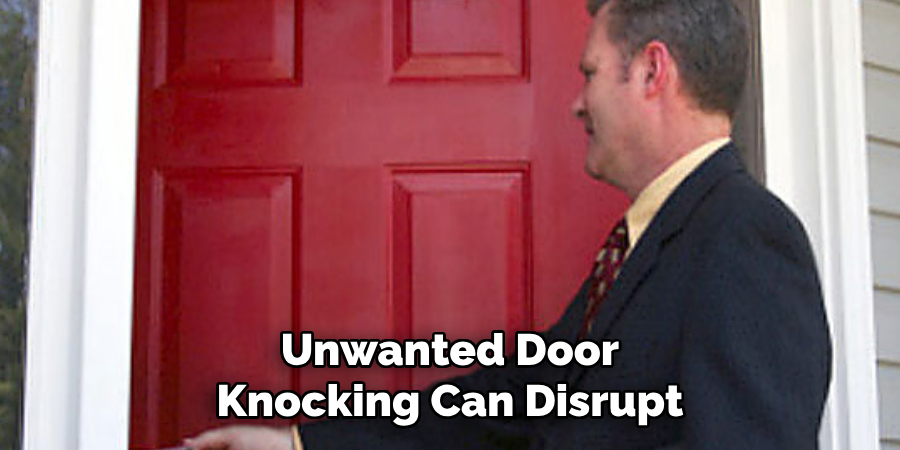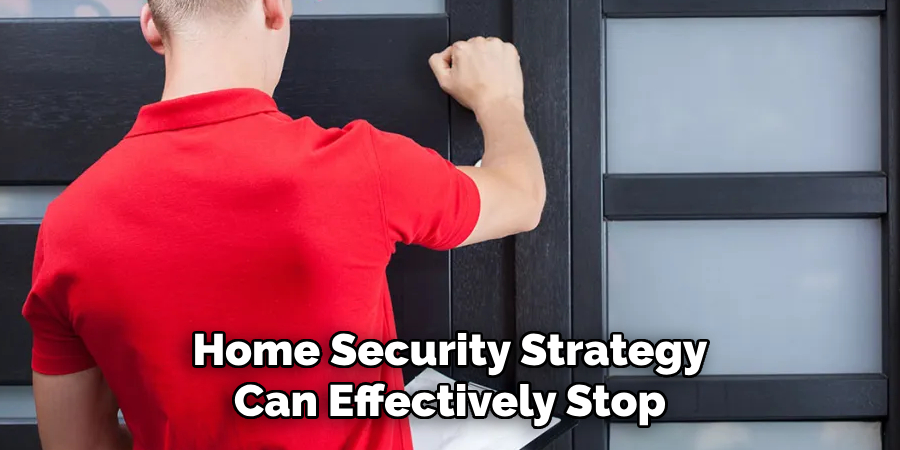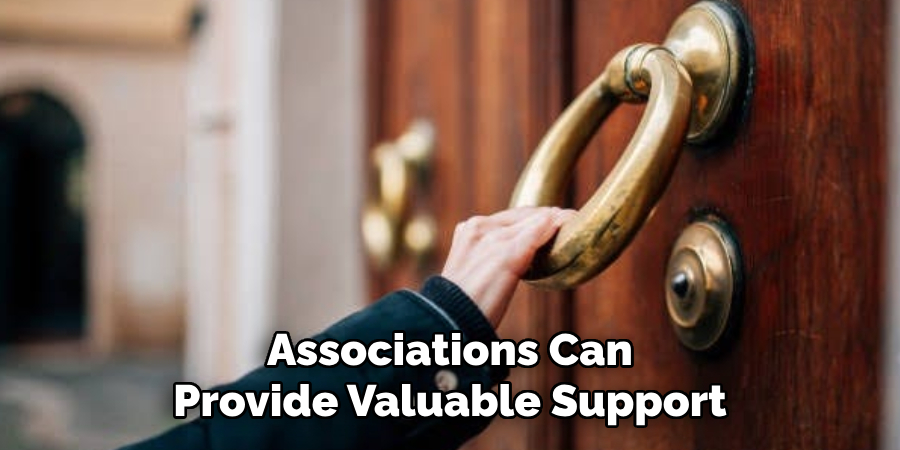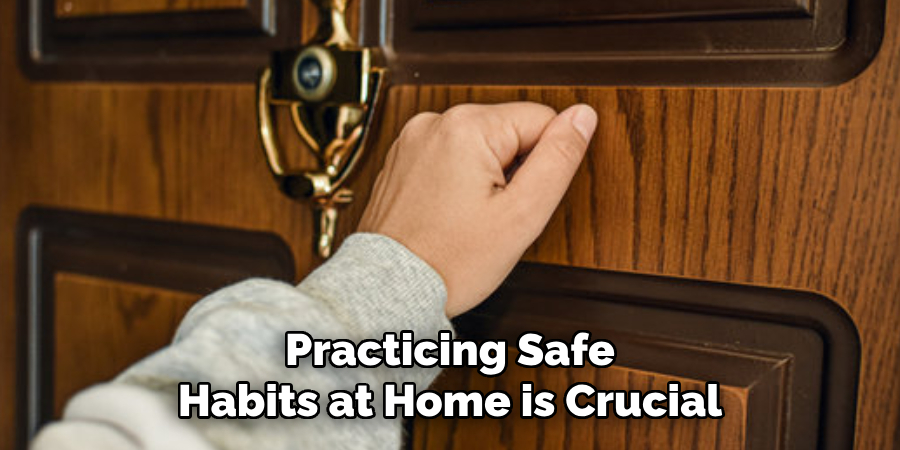Feeling safe and secure in your home is fundamental to your well-being. However, unwanted door knocking can disrupt this sense of security, whether it comes from persistent salespeople, religious canvassers, or even potential scammers. Such incidents not only invade your privacy but also create a constant source of stress and anxiety. This article aims to equip you with comprehensive strategies on how to stop someone knocking on your door.

We will explore various approaches, including communicating clear boundaries, using technology as a deterrent, and understanding your legal options. Additionally, we will offer practical advice on establishing safe practices and addressing specific scenarios you may encounter. Implementing these strategies allows you to regain control of your personal space and ensure a more peaceful living environment.
Assessing the Situation
When determining how to stop someone knocking on your door, it’s crucial to first assess the nature of the visits. Occasional solicitors, such as neighborhood kids selling cookies or a one-time visit from a local service provider, typically don’t pose a significant problem. However, persistent intrusions from aggressive salespeople, religious canvassers, or individuals disregarding your explicit wishes can quickly escalate into a stressful situation. Differentiating between these types of encounters can help you decide the appropriate level of response.

Understanding local laws and regulations regarding solicitation and trespassing is essential for taking informed action. Many municipalities have specific ordinances restricting door-to-door sales or requiring solicitors to obtain permits. Familiarize yourself with these laws to know your rights and when you can legally request someone to leave your property. Additionally, some homeowner associations have their own rules regarding solicitation within their communities.
Finally, assess your personal comfort levels and safety concerns. If a visitor makes you feel unsafe or if you have reason to believe that the knocking could be a prelude to criminal activity, prioritize personal safety above all else. Trust your instincts and take necessary precautions, such as not opening the door and contacting local authorities if the situation warrants.
How to Stop Someone Knocking on Your Door: Communicating Boundaries
A critical step in how to stop someone knocking on your door is to communicate your boundaries effectively. Start by addressing solicitors politely but firmly when they approach your doorstep. A simple yet clear statement such as “I am not interested. Please do not knock again” can convey your message without opening the door for further conversation or arguments. It helps to remain courteous but unambiguous about your stance.
Using clear signage near your door can also deter unwanted visitors. Signs such as “No Soliciting,” “Private Property,” or “Do Not Disturb” can make your preferences unmistakable. These signs remind would-be solicitors that their presence is unwelcome, often preventing them from even making the approach. Ensure the signs are visible and legible from a distance; this will maximize their effectiveness in warding off unwanted guests.

When dealing with persistent visitors, verbal boundaries need to be established firmly. If someone continues knocking despite your previous requests or your signage, reiterate your position unequivocally. You might say, “I’ve asked you not to knock on my door. I need you to leave now.” Be consistent in your responses to reinforce your boundaries. Abstaining from engaging in lengthy conversations can also help avoid potential confrontations or misunderstandings.
Combining polite but firm communication with clear, visible signs can significantly reduce the frequency and stress of unwanted knocks on your door. Taking these measures will help safeguard your personal space while maintaining your peace of mind.
How to Stop Someone Knocking on Your Door: Using Technology as a Deterrent
Incorporating technology into your home security strategy can effectively stop someone knocking on your door. One of the most popular and efficient options is installing a doorbell camera or security system with intercom features. These devices allow you to see and communicate with visitors without opening your door. Many modern doorbell cameras have high-definition video, night vision, and smartphone integration, providing real-time alerts and footage. This setup not only deters potential intruders but also lets you capture evidence if needed.
Screening visitors before answering the door is another advantage of using technology. With systems that allow you to communicate through your smartphone or another device, you can assess the situation from the safety and comfort of your own home. This is particularly useful for identifying and deterring persistent or suspicious individuals. By allowing you to decide whether to answer the door based on who is there, you maintain greater control over your interactions and reduce the risk of unwanted encounters.

Additionally, utilizing motion-activated lights or alarms can deter unwanted visitors. Motion-activated lights illuminate your property when someone approaches, often discouraging intruders who prefer to operate under the cover of darkness. Alarms triggered by motion sensors can alert you and your neighbors to potential threats, providing an added layer of security. These systems can be integrated with your overall security setup, creating a comprehensive deterrent that makes your home less attractive to solicitors and intruders and enhances your sense of safety and peace of mind.
Legal Options and Resources
Familiarizing yourself with local ordinances and homeowner rights is a critical critical tep in addressing unwanted knocks on your door. Many cities and municipalities have specific laws governing solicitation and trespassing, which can significantly aid in managing unwelcome visitors. By understanding these local regulations, you can more effectively assert your rights and take lawful actions against those who ignore your boundaries. Additionally, homeowners association (HOA) rules often provide further restrictions and guidelines on solicitation within their communities, offering another layer of protection.
Contacting local authorities or neighborhood associations can provide valuable support when dealing with persistent and intrusive visitors. Law enforcement agencies can advise on the best course of action and may intervene if the situation escalates into harassment or trespassing. Most neighborhoods also have associations that can mediate such issues and work collectively to improve community safety. They can also keep records of complaints and help you build a case if legal action becomes necessary.

Exploring legal remedies for persistent harassment or trespassing is another viable option. Legal action may be warranted if polite requests and local support fail to resolve the issue. This could include applying for a restraining order or pursuing civil litigation to hold the offender accountable. Consulting with an attorney can clarify the steps you need to take and potential outcomes. By leveraging these legal resources, you can help ensure your personal space is respected and maintained.
Establishing Safe Practices
Practicing safe habits at home is crucial for maintaining your security and well-being. One fundamental principle is never to open the door to strangers without proper verification or identification. If someone claims to be a service provider, request to see their identification through a window or security camera before considering opening the door. Preferably, make a phone call to their company to verify their purpose and identity. Many modern security systems allow for remote communication, enabling you to interact with visitors without face-to-face contact.
Another essential aspect of home safety is avoiding confrontations or escalating situations. If a visitor becomes aggressive or refuses to leave despite your clear instructions, it’s best to avoid engaging further. Instead, alert local authorities to handle the matter. Engaging with potentially hostile individuals can increase risks and make the situation more volatile. Maintaining distance and seeking help from law enforcement ensures your safety while addressing the issue legally and effectively.

Lastly, ensuring that your home security measures are up to date and functioning properly can significantly enhance your protection against unwanted visitors. Regularly check and maintain your security systems, including doorbell cameras, motion sensors, and alarms, to ensure they work properly. Upgrading outdated systems can also provide added security features, such as better video quality and improved remote access options. These proactive steps will help create a secure environment and give you peace of mind.
Addressing Specific Scenarios
Handling Religious or Political Canvassers Respectfully but Firmly
Dealing with religious or political canvassers can be challenging, but handling these encounters respectfully yet assertively is essential. A polite but firm response can be effective if you prefer not to engage. For instance, you can say, “Thank you for stopping by, but I’m not interested.” Keeping the conversation brief and maintaining a respectful tone helps prevent escalation while clearly communicating your stance. Displaying a “No Soliciting” sign at your entrance can also discourage canvassers before they knock on your door.
Dealing with Aggressive or Persistent Salespeople
Maintaining your composure and setting clear boundaries is crucial when faced with aggressive or persistent salespeople. Firmly state your lack of interest and, if necessary, repeat your statement to reinforce your decision. For example, “I appreciate your effort but am not interested. Please do not return.” If the situation feels threatening or the salesperson refuses to leave, do not hesitate to contact local authorities to ensure your safety.
Responding to Potential Scams or Suspicious Activity
Responding to potential scams or suspicious activity requires vigilance and caution. If someone seems suspicious or offers deals that seem too good to be true, avoid providing personal information or making any commitments. Trust your instincts; if something feels off, it probably is. Inform the individual that you are not interested and close the door. Report the suspicious activity to local law enforcement and your neighborhood association to alert others and prevent future incidents.
Seeking Community Support
Engaging with neighbors or local community watch groups can significantly enhance your efforts to manage door-knocking incidents. Regular communication with your neighbors allows you to share concerns and strategies, ensuring everyone is informed about potential threats and effective responses. It also helps to establish a united front, making it clear that your community is vigilant and proactive in deterring unwanted solicitations.
Participating in community watch groups or neighborhood meetings provides a platform to discuss recurring issues and develop collective action plans. Sharing experiences and tips on handling various scenarios equips everyone with better tools to manage intrusive visitors. This collaborative approach strengthens individual security and promotes a safer, more cohesive community.
By fostering a network of mutual support and vigilance, you can collectively address door-knocking incidents more effectively, ensuring that each household feels supported and secure. You can create an environment that discourages unwelcome solicitors from targeting your neighborhood.
Self-Care and Dealing with Stress
Recognizing the emotional impact of feeling intruded upon is essential for maintaining your mental well-being. The stress and anxiety from repeated unsolicited door-knocking can take a toll, leading to feelings of vulnerability and helplessness. Acknowledging these emotions rather than dismissing them is important, as they can affect your overall health.
Practicing relaxation techniques or stress management strategies can help mitigate these feelings. Techniques such as deep breathing exercises, meditation, or engaging in hobbies like reading and gardening can provide a mental break and reduce tension. Regular physical activity, such as a brisk walk or yoga, can lower stress levels and boost mood.
If the stress becomes overwhelming, seeking support from friends, family, or professional counselors is crucial. Talking about your experiences and feelings with trusted individuals can provide comfort and perspective. Professional counselors can offer coping strategies and emotional support tailored to your specific needs, helping you navigate the impact of feeling intruded upon.
Conclusion
Effectively managing and deterring unwanted door-knocking involves a combination of proactive strategies and a strong commitment to personal safety. You can significantly reduce the frequency of unsolicited visits by clearly stating your intentions, using “No Soliciting” signs, and upgrading your home security measures. When necessary, engaging with your community and local authorities strengthens your defense against persistent intrusions.
Prioritizing safety and comfort in your living space is paramount, ensuring that you feel secure and at ease in your home. Remember, knowing how to stop someone knocking on your door begins with asserting your boundaries confidently and respectfully. By doing so, you maintain both your peace of mind and the integrity of your personal space. Embrace these strategies to create a secure, comfortable environment where you can truly feel at home.

